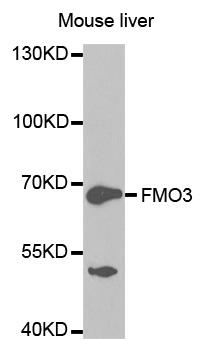FMO3 Rabbit Polyclonal Antibody
Frequently bought together (3)
Recombinant protein of human flavin containing monooxygenase 3 (FMO3), transcript variant 1
USD 867.00
Transient overexpression lysate of flavin containing monooxygenase 3 (FMO3), transcript variant 1
USD 396.00
Other products for "FMO3"
Specifications
| Product Data | |
| Applications | ICC/IF, WB |
| Recommended Dilution | WB 1:500 - 1:2000;IF 1:50 - 1:200 |
| Reactivities | Human, Mouse |
| Host | Rabbit |
| Isotype | IgG |
| Clonality | Polyclonal |
| Immunogen | Recombinant protein of human FMO3 |
| Formulation | Store at -20°C (regular) and -80°C (long term). Avoid freeze / thaw cycles. Buffer: PBS with 0.02% sodium azide, 50% glycerol, pH7.3. |
| Concentration | lot specific |
| Purification | Affinity purification |
| Conjugation | Unconjugated |
| Storage | Store at -20°C as received. |
| Stability | Stable for 12 months from date of receipt. |
| Predicted Protein Size | 60 kDa |
| Gene Name | flavin containing monooxygenase 3 |
| Database Link | |
| Background | Flavin-containing monooxygenases (FMO) are an important class of drug-metabolizing enzymes that catalyze the NADPH-dependent oxygenation of various nitrogen-,sulfur-, and phosphorous-containing xenobiotics such as therapeutic drugs, dietary compounds, pesticides, and other foreign compounds. The human FMO gene family is composed of 5 genes and multiple pseudogenes. FMO members have distinct developmental- and tissue-specific expression patterns. The expression of this FMO3 gene, the major FMO expressed in adult liver, can vary up to 20-fold between individuals. This inter-individual variation in FMO3 expression levels is likely to have significant effects on the rate at which xenobiotics are metabolised and, therefore, is of considerable interest to the pharmaceutical industry. This transmembrane protein localizes to the endoplasmic reticulum of many tissues. Alternative splicing of this gene results in multiple transcript variants encoding the same protein. Mutations in this gene cause the disorder trimethylaminuria (TMAu) which is characterized by the accumulation and excretion of unmetabolized trimethylamine and a distinctive body odor. In healthy individuals, trimethylamine is primarily converted to the non odorous trimethylamine N-oxide. |
| Synonyms | dJ127D3.1; FMOII; TMAU |
| Reference Data | |
| Protein Families | Druggable Genome, Transmembrane |
| Protein Pathways | Drug metabolism - cytochrome P450 |
Documents
| Product Manuals |
| FAQs |
| SDS |
{0} Product Review(s)
0 Product Review(s)
Submit review
Be the first one to submit a review
Product Citations
*Delivery time may vary from web posted schedule. Occasional delays may occur due to unforeseen
complexities in the preparation of your product. International customers may expect an additional 1-2 weeks
in shipping.






























































































































































































































































 Germany
Germany
 Japan
Japan
 United Kingdom
United Kingdom
 China
China



